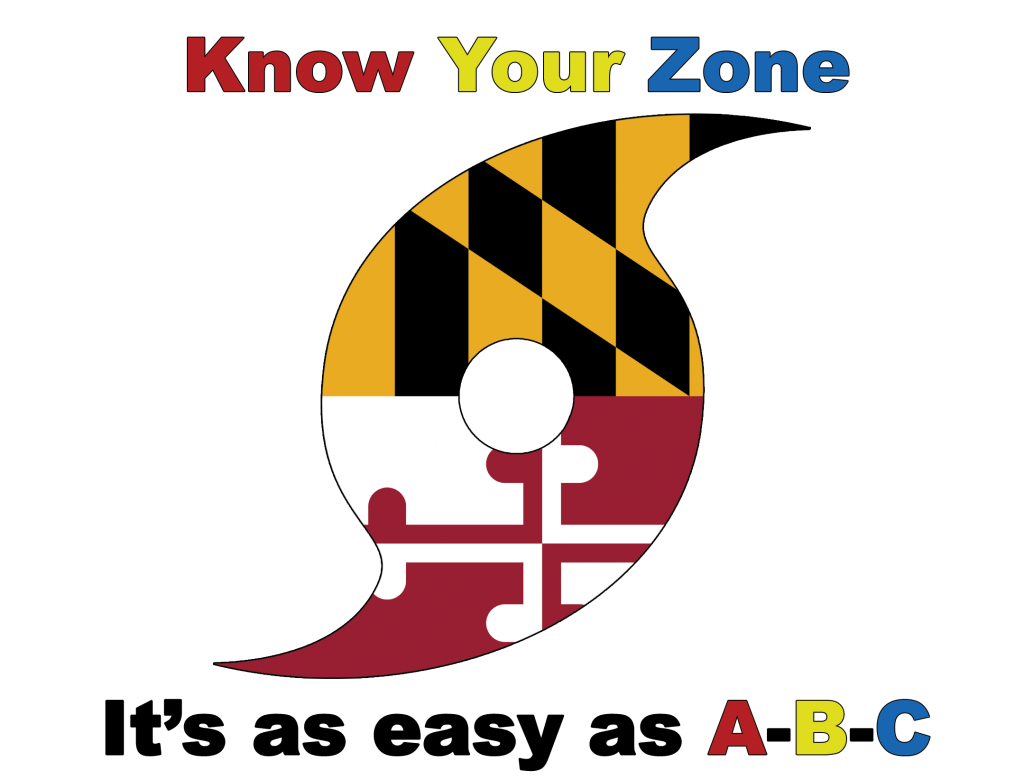2021 Atlantic Hurricane Season Starts on Heels of Record Year
Marylanders in Coastal, Tidal Areas Should “Know Your Zone” |
 |
Reisterstown, Md. (June 1, 2021) — The 2021 Atlantic Hurricane season starts today, and the Maryland Emergency Management Agency reminds residents that while the effects of the pandemic are beginning to wane, COVID-19 precautions should still be a part of their planning. Residents who live near the Atlantic Ocean, the Chesapeake Bay and its tributaries, and along the tidal Potomac, also should be familiar with the state’s Know Your Zone evacuation program.
The National Weather Service and other forecasters are predicting a busier than usual hurricane season this year on the heels of a 2020 season that saw a record-setting 30 named storms, 14 of which became hurricanes. Tropical Storm Isaias made landfall in Maryland, leading to a Presidential Disaster Declaration for the state and three counties.
“As we learned last year, it just takes one storm hitting your area to make a severe impact,” said Russ Strickland, MEMA executive director. “It is important to make preparations before the season starts, make sure COVID-19 precautions are considered in your family plan and be ready to follow the directions of local emergency officials.”
MEMA coordinated with other state agencies, local, and federal partners to update hurricane, and all natural hazards to ensure that the state is prepared for hurricane season. As with the 2020 hurricane season, planners identified shelters with less open space and more individual rooms, such as hotels and motels, apartments and rental properties to reduce the possible transmission of COVID-19, even as the effects of the pandemic are starting to ease.
Make sure your emergency kit continues to have COVID-19-related supplies, like extra face coverings, hand sanitizer and disinfectant. While mask and spacing mandates are being relaxed, you may be more comfortable having these supplies if you need to go to a shelter.
It also may be important to allow extra time to evacuate because shelters might be farther away. As always, you are better off locating shelter with family or friends outside the expected danger zone or stay at an accommodation of your choice.
Marylanders also should Know Your Zone to see if the places you live, work or visit are in one of Maryland’s three evacuation zones. The Know Your Zone program allows local emergency officials to order evacuations by letter zones (A, B and C) to more easily provide information to those in the area.
Remember that even if you are not in one of the Maryland evacuation zones, you could still feel the effects of hurricanes and other hazards. Hurricanes can spawn flash floods, severe thunderstorms, and tornadoes many miles away from the eye of the storm and 100 miles or more inland.
Here are some additional considerations while planning for hurricanes and other hazards:
- Pay attention to emergency information and alerts.
- Determine your best protection for high winds and flooding.
- Unless you live in an evacuation zone, make a plan to shelter-in-place in your home, if it is safe to do so.
- If you live in a mandatory evacuation zone, make a plan with friends or family to shelter with them where you will be safer and more comfortable.
- Check with local authorities for the latest information about public evacuation shelters.
- Only use outdoor generators that are at least 20 feet away from your home and away from windows, doors, and vents.
- Do not walk, swim, or drive through flood waters.
For more information about hurricane preparedness, please visit MEMA, FEMA, the National Weather Service and the American Red Cross.
For access to preparedness tips and information, install the MD Ready web app by visiting MdReady.Maryland.gov on your mobile device’s web browser. To receive text alerts, tips, and resources related to threats and hazards that may affect Maryland (including COVID-19), text “MdReady” to 898-211.
###
CONTACT:
Jorge Castillo, jorge.castillo@maryland.gov, 443-381-3518
Ed McDonough, ed.mcdonough@maryland.gov, 410-446-3333
24/7 line: 877-636-2872
